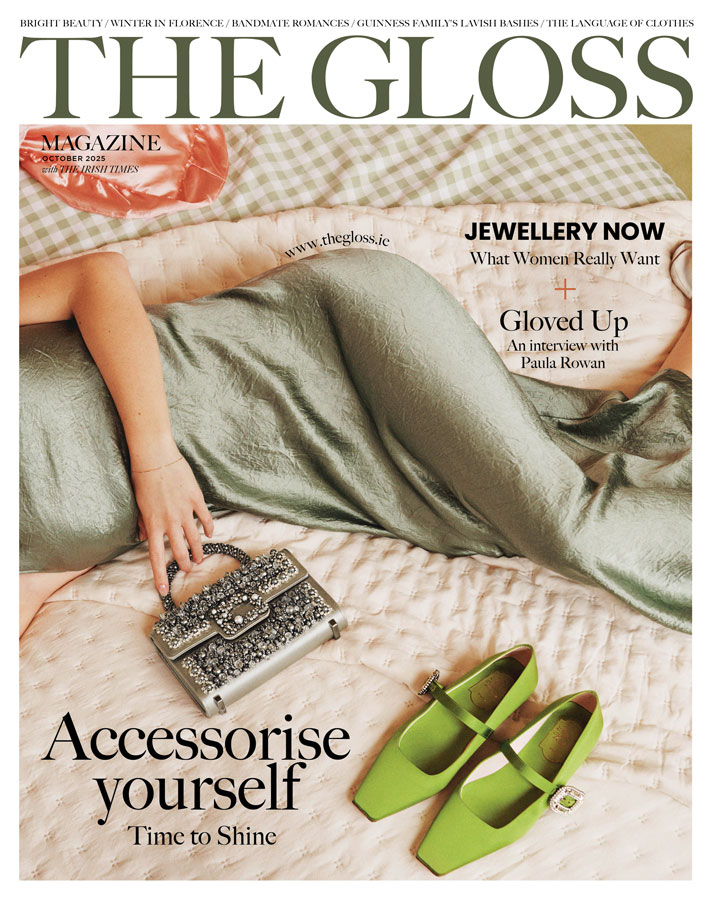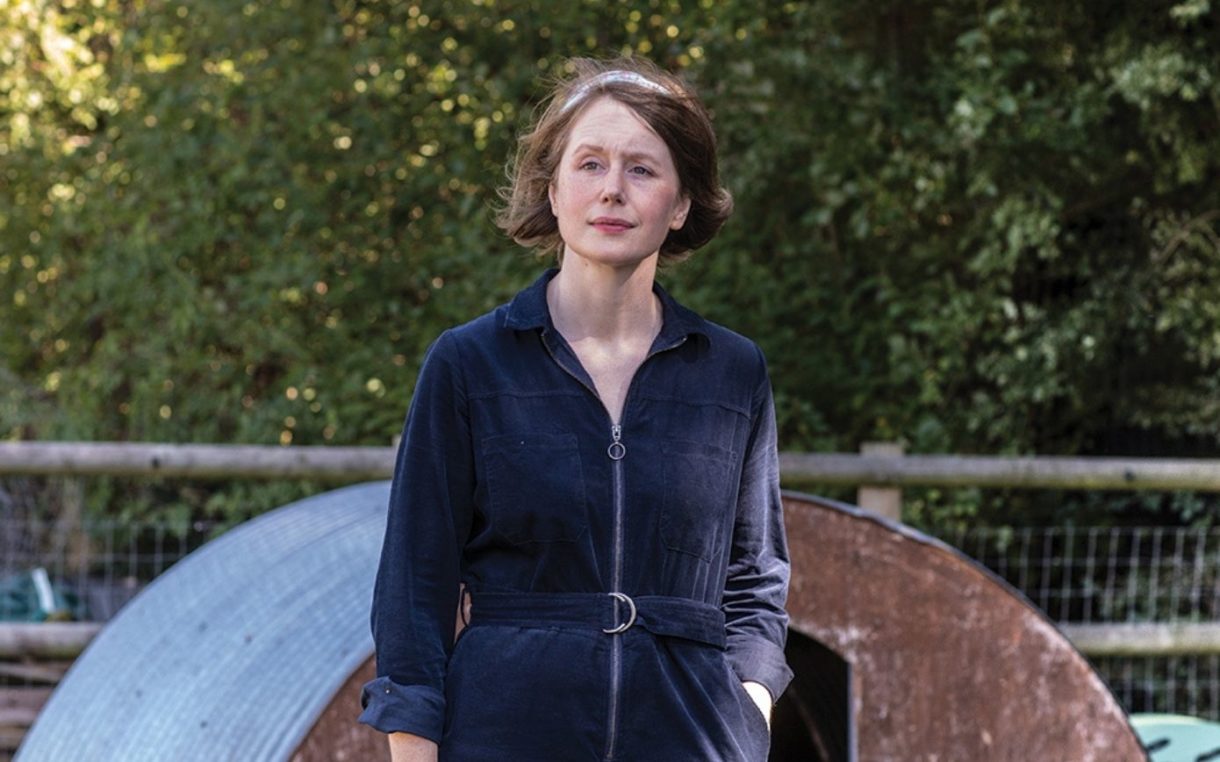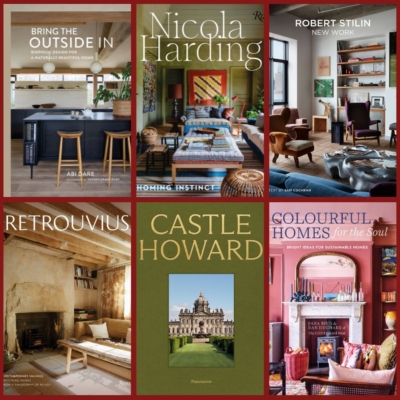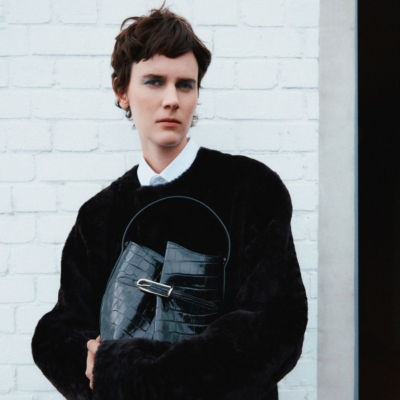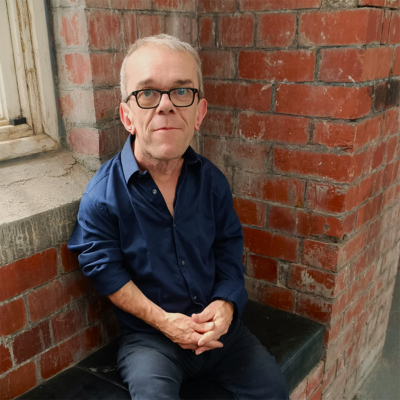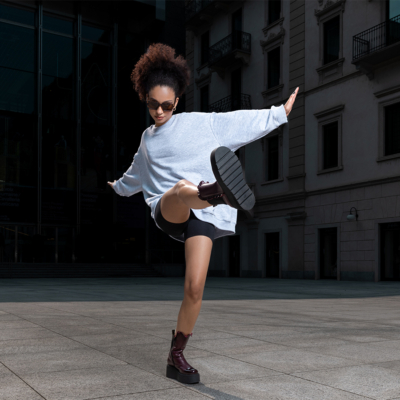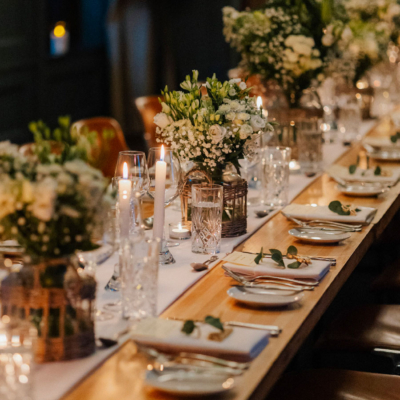Journalist and author Rebecca Schiller turned fantasy into reality in 2017, moving her family to a countryside smallholding for a life of sowing and growing. But as the first few years go by, and the ever-expanding list of tasks remains stubbornly long, it becomes clear that hers is not the simple life she had envisaged. In an extract from her new book, Earthed, she describes how, one day, overwhelmed, she lost it …
Over breakfast, something small finally tips me off that ledge – the one I have been balancing on for quite some time. I hold the glass jar of coffee beans in both hands over my head and bring it towards the floor, via the top of my skull, with force. Under the instant landslip of adrenalin, I realise I’ve been waiting for this moment: secretly hoping it will come, rigid with the effort of preventing it.
It’s almost a relief to give in. I’m hoping for blood: a gash and then a warm trickle that fills the creases of my forehead and drips rhythmically onto the kitchen’s grey tiles. I am sick of trying to explain this with words that I can’t get right and that everyone seems to ignore or forget. So today, in a split-second reaction, I decide I need to leave enough of a mark so that even when I wipe my eyes and pull myself together later, neither my husband Jared nor I will be in no doubt that there is something very wrong.
Shelf, hand, forehead: the jar hits the floor, rolls and barely even chips. Jared, my husband, looks shocked, angry even, but not full of realisation. I put my fingers to my forehead and they come away clean. There is only a dull ache and a stupid little egg on my hairline and it is not enough. So then something else: better, louder, more painful. Four delicate pottery cups, handmade to look and feel like wood and just the right size in my hand. A decade-old gift from my mother that I had wrapped and unwrapped each time we moved, relieved that they hadn’t accidentally cracked along the way. Today I throw them all at my favourite piece of furniture, an antique dresser that displays our family treasures. Photographs of the children, our wedding; 1940s Martini glasses collected for Jared’s birthday; a card hand-printed by a friend reading only, “Peace”.
The dresser door smashes as the first cup hits. The second takes out the objects within. I barely register the third and the fourth meeting my palm and leaving again a split second later. But they do. Last of all, perhaps for completeness, I pick up the matching jug. The final piece of a set that had been chosen with care and given with love. I lob it like a grenade.
There is rubble when a person explodes. Glass everywhere mixed with shards of ochre, duck-egg blue, deep black and winter green. A tasteful rainbow of destruction underscored by little breathy sounds of shock and a cockerel crowing outside.
I am blank. I hear static noise, the ends of my fingers tingle but the whirling anger and panic has finally gone. My feelings are in pieces on the floor and that’s fine. I sure as hell don’t want to stick them back together again.
I stand there, numbly, waiting for the fallout, the reaction, the judgment to be handed down. For Jared’s strong arm to land on mine and march me out and, in a shout-whisper, tell me that I can’t behave like this ever again. Or maybe to be scooped up and put to bed with an ice pack and instruction to sleep. Perhaps he’ll insist I cancel my day of meetings and get some help right now. I don’t know what it is that I want from him, apart from a response.
There is only silence. Jared is rooted to the spot and the children – who have just appeared – are looking on with huge eyes and pale faces. Centuries pass while I wait for him to join the dots and meet me here in this awful place – a corner with no way out where everything is dangerous and broken, including me. I am not even trying to hide it any more. But I just stand there in the quiet, feeling a hot wind blowing across the fields behind me, hitting my back and trying to push me closer to the danger. No one is coming and the all-aloneness of the moment becomes more obvious with every second that passes. It is just me, in the dark, and I can’t bear it.
And so eventually I stop waiting. I pour myself a cup of coffee, open the cutlery drawer and use a knife to spread peanut butter onto bread. I collect my bag and keys – an odd calm bolted over the adrenalin rush – and pick through the room hearing fragments hit the walls as my feet send them skittering. As I leave to catch my train, turning back with a shout of ‘have a nice day’, there is no reply. All three of them look at me as though I’ve lost my mind. Which of course I have.
My day of work goes well despite the preface. I’m good at this stuff, whatever the run-up. I put the morning away somewhere I can’t reach – pushing it further as the train takes me to the city. When I’m there, meeting people, I don’t have time or space in my head for anything else. As well as actively reminding myself to listen to what’s being said, I am also instinctively taking in the bigger picture and decoding the dynamics of the room. My antennae are tuned to the unspoken things that matter: a shadow under someone’s eyes; a micro-glance at the water bottle as they balance thirst with not wanting to interrupt, the way they hold themselves taut at the mention of someone else’s pregnancy. I am at capacity with the effort of putting all this together, making a formula and turning myself into its answer, so it’s only when I’m walking through the streetlamp-lit station car park that this morning becomes real again and I start to feel a bit sick.
The house is spotless – tidier than when I left. All traces of what happened earlier have been removed and if you didn’t know the things that were here before I destroyed them you wouldn’t miss their presence. It’s the kind of quiet that tells me the children are in bed; a hush that highlights how nervous I am about facing the intervention to come.
There is rubble when a person explodes. Glass everywhere mixed with shards of ochre, duck-egg blue, deep black and winter green. A tasteful rainbow of destruction underscored by little breathy sounds of shock and a cockerel crowing outside.
“Hi,” I say with studied casualness as I walk towards Jared in the kitchen. “Hello,” he replies; a little wary perhaps, but not hostile. He asks about my day and so I tell him: the meetings, the promise of something exciting, the annoying email. He offers things up from his day and, though we are stilted, a light remark and half-laugh seem to go over okay. It takes me half an hour of this to realise that the conversation I have been expecting is not on the cards. If I don’t bring up what took place over breakfast it might never be mentioned again. I know I should do it: be brave, apologise, try to explain why it happened and how I am going to make sure it doesn’t again. Make a plan to fix this, fix us, fix me; but I have been doing versions of this for a while now and I don’t have anything left.
So instead, after eating and watching something I can’t remember, I lie on the precipitous edge of our bed and think about that summer day three years ago when we started to talk about the future and ended up, five months later, on this plot. Excitement, shared purpose and a plan – I tell myself that these things propelled us, but I wonder if there’s another story that’s also true. In this story it’s all my fault. I’m the impulsive one who pushes harder and has it all scoped out with the answers to every possible question prepared in advance. A story in which I have good ideas and a drive to bring them to life so Jared plays along. And somehow our new life becomes my project – though I’d never have set out to do it alone. I am unchecked and leading the charge and so I take the responsibility, the credit and the blame as we move apart instead of together. Maybe that’s the real story. Maybe not.
I want to understand what went wrong, but the past has split and I don’t know which version is true. I don’t know whether it’s normal that we are not talking about the way I shattered into sharp pieces this morning. I can’t tell if something big and bad happened today or if everything is fine. There are so many possible scenarios and I have tried to make a plan for each, just in case. But these responses, every one given an equal weighting, don’t resolve anything and instead become staccato fragments arguing in my head. Sleep will shush them for a bit though and so I try to get to it by focusing on the only thing that feels certain: the ceiling, the air and, above it all, the expanding infinity of space – which has nothing on the distance between my husband and me on the mattress tonight.
The next morning we carry on ignoring everything that matters. Still, I take the last bit of bravery I must have stored in my little toe for such emergencies, and begin the one piece of repair work I know I have to do: apologising to the children. I pull them close to show them that my knee is still a safe place. I tell them that I understand how they might feel because when I was a little girl it frightened and upset me when people would volcano their feelings seemingly out of nowhere. I say that I am so sorry and that I will do better. They appear to be fine, taking it all as read, relaxing into my arms and, after they have gone to school, I try to reassure myself that it’s the apology that counts, that all I have to be is good enough as often as I can. But this was not good enough and I know it.

Earthed, My Year of Hope and Hard Lessons from the Land, Elliott and Nicholson, is out now.
LOVETHEGLOSS.IE?
Sign up to our MAILING LIST now for a roundup of the latest fashion, beauty, interiors and entertaining news from THE GLOSS MAGAZINE’s daily dispatches.




